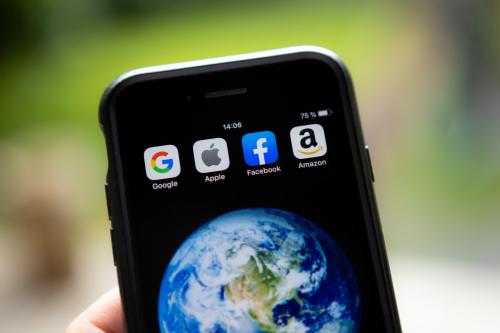“Tech companies have built a perfect record so far in blocking major legislation in Congress,” The Wall Street Journal observed as the final effort to pass tech-related regulation failed in the closing days of the 117th Congress. However, the same companies that spend lavishly to oppose American consumer protection efforts are buckling under as European Union (EU) rules prepare to be phased in between now and 2024.
What $100 Million Buys
A key to Big Tech’s unblemished record, The Wall Street Journal reported, was “prodigious spending on Beltway lobbying and grassroots politicking.” Advertising to influence Congress not to pass tech-related legislation exceeded $100 million, the story continued.
Much of this advertising was alarmist as opposed to factual. One television commercial by the Consumer Technology Association (CTA) warned that Congress wants to “dismantle technologies we depend on.” The ad closed with the alarmist line, “Don’t take away our tech.”
Far from taking anything away, Congress was proposing protecting children from harmful content (the Kids Online Safety Act), giving app developers and consumers more rights in app stores (the Open App Markets Act), and expanding consumer choice by prohibiting e-commerce platforms from giving preference to their own products (the American Innovation and Choice Act). That these limited actions were the best Congress could try to accomplish was, itself, the result of the ongoing advertising and lobbying blitzkrieg of tech companies.
What had appeared to be progress on legislation protecting the privacy rights of Americans was stopped by industry lobbying. After being reported out of the House Commerce Committee with a bipartisan 53-2 vote, The American Data Protection and Privacy Act never made it to the House floor.
A similar situation occurred regarding antitrust legislation. After an exhaustive House Judiciary Committee report, the opportunity for broad antitrust legislation looked hopeful when a series of bills were sent to the House floor with bipartisan support. Again, the bills never received a House vote.
In the Senate, both the Open App Markets and the American Innovation and Choice bills were reported by the Judiciary Committee, both with bipartisan support but died from inaction on the floor.
To achieve these results, Big Tech and its trade associations have peddled a never-ending series of incendiary messages such as:
- “Why is Congress considering legislation that makes us less safe?” another one of the CTA’s commercials This one alleged that legislation would allow “cyber warfare against the U.S.”
- “Don’t break what works” warned the Computer & Communications Industry Association (CCIA) commercial. “Congress has plans that could stop progress in its tracks, breaking the products and services you love,” the ad warned.
- In another commercial, CCIA warned the inability to preference Amazon products over competitors would destroy Amazon’s famous delivery service. “Don’t break our Prime,” the ad warns.
The Scares Didn’t Sell in Europe
While the companies were spending $100 million to block the U.S. Congress from acting, the EU has moved forward on some of the very same issues. In particular, the messaging that seemed so frightening here failed to impress the European Parliament. As a result, the EU’s recently passed Digital Markets Act (DMA) and other activities are already accomplishing for European consumers what Congress has failed to accomplish.
For example, a target of the CTA “Don’t take away our tech” commercial was the Open App Market Act, which would give app developers more rights in the Google and Apple app stores. Confronted by the EU’s DMA, however, Apple is preparing to give European iPhone and iPad consumers the ability to download third party software without using the Apple App Store (so-called “sideloading”). The company is even discussing allowing alternative app stores with alternative payment systems on its platform. Already, Apple has been forced to allow such outside services for dating apps in the Netherlands.
The CCIA “Don’t break our Prime” commercials were targeted at legislation to end Amazon’s practice of giving preference to its own products. Amazon, however, has just agreed to a settlement with EU regulators that will prohibit it from engaging in such practices. Henceforth, in the EU, Amazon will give rival products access to valuable “Buy Box” real estate on the website. In addition, Amazon agreed to not use the non-public data the platform sees when independent sellers use Amazon to compete against those sellers.
An EU regulator just issued a preliminary ruling that Meta platforms cannot tie use of its Facebook platform to its Marketplace advertising in order to disadvantage competitive ad services. Nor can the company use its terms of service to coerce users into allowing the use of third-party advertising data to target Facebook or Instagram advertising. Meta will have an opportunity to challenge the ruling.
The EU has also just adopted a “Common Charger Directive” that requires small electronic devices to be compatible with the USB-C charging plug used by most device manufacturers. This means that Apple will no longer be able to insist consumers buy its proprietary Lightning cable. “Buyers will also be able to choose whether they want to purchase new electronic equipment with or without a charging device,” the EU explained. Apple is reportedly preparing to implement the directive.
So Far Europeans Only
Thus far, the actions of American companies appear to only benefit European consumers. It will be interesting to see what Big Tech and their industry association do in the next Congress when confronted with, “You can do this to help Europeans, why not help Americans?” Scare tactic advertising won’t answer that question.
Apple, Google, Meta, and Amazon are unrestricted donors to the Brookings Institution. The findings, interpretations, and conclusions posted in this piece are solely those of the author and are not influenced by any donation.







Commentary
Big Tech giving European consumers what they deny Americans
December 28, 2022